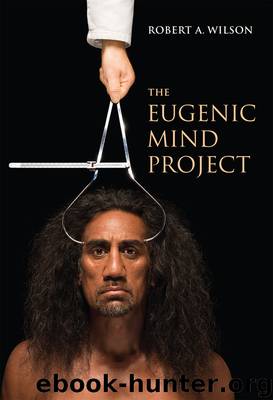The Eugenic Mind Project by Wilson Robert A.;

Author:Wilson, Robert A.;
Language: eng
Format: epub
Tags: Fragile sciences; Human diversity; Human nature; Immigration restriction; Kinds of people; Newgenics; Prenatal screening; Sterilization; Standpoint eugenics; bioethics; history of science; philosophy of mind; disability studies; genetics; medical ethics; social movement; policy; law; Canada; Canadian; Alberta; sterilization; undesirable; politics; cognitive science; survivors; population
Publisher: MIT Press
Published: 2018-02-22T05:00:00+00:00
7
Back Doors, Newgenics, and Eugenics Underground
7.1 Newgenics
Both the constructivist and the socio-cognitive frameworks for addressing the puzzle of marked variation recognize the contemporary significance of marked variation to the disability community, which therefore is relevant to more than the eugenic past. While both frameworks contribute to our understanding of the persistence of eugenics, I have argued that the socio-cognitive framework provides an explanatorily richer and deeper account of that persistence, and of the marked variation that underlies it. Beyond that, what marked variation is marked for or marked as are a further pair of questions whose answers affect and reflect how we view that eugenic past. The perspective of a standpoint eugenics sharpens the focus on the relationship between the eugenic past and present attitudes, values, and practices, particularly regarding disability, both by asking such questions and by providing distinctive answers to them.
As an emerging scientific enterprise originating in the last third of the nineteenth century, as well as a social movement whose heyday ended in 1945, eugenics had the aim of improving intergenerationally the quality of human lives by changing the composition of particular human populations to produce more desirable and fewer undesirable people. For many contemporary geneticists, historians, philosophers, and bioethicists, it is this idea of human improvement or betterment in the history of eugenics that looms largest in how they think of the relationship between past and present. For them, early twentieth-century eugenics was problematic primarily in its epistemic basis and execution, and they find little to object to in the idea of enhancing desirable traits found prevalently in human populations while reducing the incidence of minority traits associated with disability.
A recognition of the ill-fated nature of eugenics as a historical phenomenon requires denigrating early eugenic science and social policies, and sorting the wheat from the chaff in the eugenic past has involved recoding contemporary discourse and practices to sharply distinguish the old from the new. For example, in his defense of what he calls “liberal eugenics,” Nicholas Agar proclaims that “experts on human genetics consulted by the prospective parents of tomorrow’s liberal societies will give vastly better scientific advice than that given by Hitler’s scientific lackeys.” Enhancing humans by manipulating traits is altogether different. For bioethicists, much as for historians, eugenics is past. Or at least insofar as eugenics remains present in aims of melioration and human improvement to be achieved by technologically mediated and scientifically informed intergenerational interventions on human populations, it is a question of how to avoid falling into forms of eugenics that replicate, mimic, or build on the epistemically and morally problematic features of eugenics past.
By contrast, and as our standpoint-driven discussion in chapters 3 and 4 intimated, the identification of certain sorts of people as bearing eugenic traits was part of a subhumanizing process. In terms that we introduced in chapters 5 and 6, the marked variation associated with eugenic traits was marked for segregation, marginalization, and even elimination; certain sorts of people were marked as subhuman, and treated as such. The
Download
This site does not store any files on its server. We only index and link to content provided by other sites. Please contact the content providers to delete copyright contents if any and email us, we'll remove relevant links or contents immediately.
Enlightenment Now: The Case for Reason, Science, Humanism, and Progress by Steven Pinker(7309)
A Journey Through Charms and Defence Against the Dark Arts (Harry Potter: A Journey Through…) by Pottermore Publishing(4811)
The Immortal Life of Henrietta Lacks by Rebecca Skloot(4582)
A Journey Through Divination and Astronomy by Publishing Pottermore(4384)
Elon Musk by Ashlee Vance(4123)
Origin Story: A Big History of Everything by David Christian(3691)
COSMOS by Carl Sagan(3621)
Alchemy and Alchemists by C. J. S. Thompson(3516)
Bad Pharma by Ben Goldacre(3424)
Enlightenment Now by Steven Pinker(3367)
Shadow of Night by Deborah Harkness(3362)
Inferior by Angela Saini(3311)
A Mind For Numbers: How to Excel at Math and Science (Even If You Flunked Algebra) by Barbara Oakley(3304)
Origin Story by David Christian(3198)
The Code Book by Simon Singh(3186)
Signature in the Cell: DNA and the Evidence for Intelligent Design by Stephen C. Meyer(3133)
The Elements by Theodore Gray(3054)
A Brief History of Time by Stephen Hawking(3023)
A Journey Through Potions and Herbology (A Journey Through…) by Pottermore Publishing(2852)
